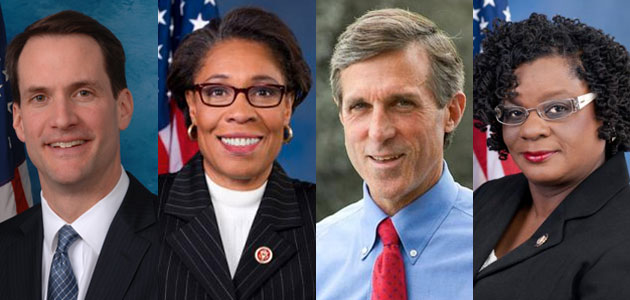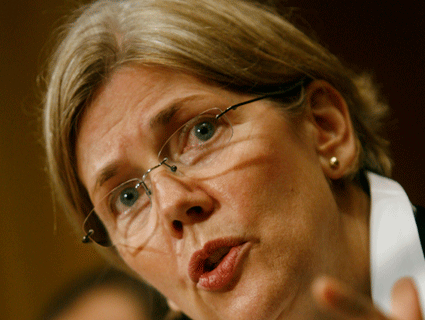
Rep. Jim Himes (D-Conn.), Rep. Marcia Fudge (D-Ohio), Rep. John Carney (D-Del.), Rep. Gwen Moore (D-Wisc.)<a href="http://en.wikipedia.org/wiki/Marine_Special_Operations_Regiment_%28United_States%29">Wikipedia</a>/<a href="http://fudge.house.gov/official-portrait/">House.gov</a>/<a href="http://www.facebook.com/photo.php?fbid=10151037049373473&set=pb.24981118472.-2207520000.1364935720&type=3&theater">Facebook</a>/<a href="http://gwenmoore.house.gov/official-portrait/">House.gov</a>
Many of the laws that Congress passed to rein in big banks in the wake of the 2007 financial meltdown have yet to go into effect, but lawmakers are already working to dismantle them. And it’s not a partisan thing either.
A group of 21 House lawmakers—including eight Democrats—is pushing seven separate bills that would dramatically scale back financial reform. The proposed laws, which are scheduled to come before the House financial-services committee for consideration in mid-April, come straight on the heels of a major Senate investigation that revealed that JP Morgan Chase had lost $6 billion dollars by cooking its books and defying regulators—who themselves fell asleep on the job. Why the move to gut Wall Street reform so soon? Financial-reform advocates say Democrats might be supporting deregulation because of a well-intentioned misunderstanding of the laws, which lobbyists promise are consumer-friendly. But, reformers add, it could also have something to do with Wall Street money.
“The default position of many members of Congress is to do what Wall Street wants. They are a main source of funding,” says Bartlett Naylor, a financial-policy expert at the consumer advocacy group Public Citizen. “These are relatively complicated [bills]. It’s easy to come to the misunderstanding that they are benign.”
The seven bills, all of which alter the landmark 2010 Dodd-Frank financial-reform law, deal with derivatives, financial products that have values based on underlying numbers, like crop prices or interest rates. Some economists believe these products helped lead to the 2007 financial collapse. The House agriculture committee, which handles derivatives regulation, considered the Dems’ bills in late March, and legislation will now move to the House financial-services committee within the next couple of weeks for a vote. But although all of the proposed bills have been presented as technical fixes to Dodd-Frank, financial-reform advocates say that’s not true.
Reformers’ main complaint is that it’s too early to tweak Dodd-Frank. Although the massive financial-reform law passed more than two years ago, all of its provisions must go to regulatory agencies to be crafted into rules before they have any effect in the real world. Because of heavy industry lobbying to weaken or kill the regulations, two-thirds of the 400-odd rules are still not finalized. And yet members of Congress, including many Democrats, are already piling on top of Wall Street’s attacks with ones of their own.
Reps. Gwen Moore (D-Wis.) and Marcia Fudge (D-Ohio), both of whom are members of the lefty House progressive caucus, cosponsored the Inter-Affiliate Swap Clarification Act along with two Republicans. Moore and Fudge’s bill would allow certain derivatives that are traded among a corporation’s various affiliates to be exempt from almost all new Dodd-Frank regulations. The Commodity Futures Trading Commission (CFTC), a major Wall Street regulator, just issued its final rule on these products on Monday, and although the rule includes many exemptions, reform advocates say it is still stronger than what Fudge and Moore’s legislation proposes.
Fudge advocated for the bill “because it came at request of corporations and businesses in our district,” says Belinda Prinz, a spokeswoman for the congresswoman. Both Fudge’s office and a legislative aide in Moore’s office played down the impact of the bill, emphasizing that it would not exempt big banks from new financial regs and would just apply to corporations looking to manage risk.
Mike Konczal, a fellow at the Roosevelt Institute and expert on financial regulation, says the new regulation should get a chance to work before it is changed. “It’s not time yet,” he says, adding that “the industry is saying that even if it’s a little burdensome, it’s too much.” Plus, even the CFTC has acknowledged that the sorts of products covered by Fudge and Moore’s bill can still pose a risk to the wider financial system. “If [one corporation] blow[s] up, it can affect other firms,” says Konczal. “There would be a domino effect.”
Moore received about $120,000 from the banking and finance industries during the 2012 election cycle. Fudge took in about $31,000.
Another bill, the Swaps Regulatory Improvement Act, sponsored by Democratic Reps. Jim Himes (D-Conn.) and Sean Patrick Maloney (D-N.Y.), would expand the types of trading risks that banks can take on while still being backed by taxpayers.
Himes contends that two other sections of the Dodd-Frank law protect taxpayers from liability. He tells Mother Jones that his bill doesn’t change the part of the law that forbids taxpayer money from being used to bail out bad derivatives trades. Himes also points to the Volcker rule, a section of the law that would prohibit banks from making trades for themselves, instead of on behalf of their customers.
The problem, again, is that these parts of the law have not been finalized as rules, and they could still be gutted by the rule-making process. The two sections Himes cited are still “very much in the crosshairs of Republicans,” Konczal says, pointing out that Rep. Paul Ryan (R-Wis.) has already tried to eliminate the section prohibiting taxpayer bailouts of banks. And as far as the Volcker rule, “We don’t have a Volcker rule,” Konczal says. Since it has not been finalized, no one knows if it will be strong, or riddled with loopholes. (After this story pubbed, Marcus Stanley of Americans for Financial Reform contacted Mother Jones to contend that neither of these sections would address all the problems created by Himes’ and Maloney’s bill.)
Himes took in almost $750,000 from the banking and finance sector in 2011 and 2012, including $35,000 from Goldman Sachs, where he used to be a vice president. Maloney got $170,000 from the industry in the last election cycle. (Maloney’s office did not return multiple phone and email requests for comment on why he sponsored the deregulatory bill.)
Yet another Democratic bill would allow big multinational US banks to get out of US regulations by operating through their international arms. Current Dodd-Frank provisions allow foreign banks to be exempt from US rules if their host country’s rules are comparable. The Swap Jurisdiction Certainty Act, whose sponsors include Reps. John Carney (D-Del.) and David Scott (D-Ga.), sets up the presumption that foreign regs are just as strong as US rules, and puts the burden of proving otherwise on the CFTC and the Securities and Exchange Commission (SEC), another financial regulatory agency. The regulators would have to draft a report for Congress on the thinking behind their decisions, and draw up identical rules, making it harder for them to regulate, says Dennis Kelleher of the financial-reform advocacy group Better Markets.
“It is very easy for global Wall Street banks to conduct derivatives transactions through foreign affiliates,” says Marcus Stanley, of Americans for Financial Reform. “So unless regulators ensure proper oversight of those affiliates, we won’t have effectively regulated the derivatives markets at all.”
James Allen, a spokesperson for Carney, stated in an email that the reports to Congress “help everyone better meet the standards set forth by the [regulatory] commissions.”
Carney got $207,000 from the banking and financial sectors in 2012; Scott, whose office did not return multiple requests for comment, received $148,000.
The financial sector as a whole contributed $6.6 million to House agriculture committee members between 2010 and 2012—more than any other sector. The PACs of the top four commercial banks in the United States—Bank of America, Goldman Sachs Bank, Citibank, and JPMorgan Chase—which account for almost all derivatives contracts, have given $313,000 to agriculture committee members since 2009. “There’s a lot of money at stake here,” Stanley says. “Big money is not a partisan issue,” he says. “So don’t think for a moment that you can simply look at whether a bill is ‘bipartisan’ and judge from that whether it is a threat to financial reform.”
Jeff Connaughton, a former investment banker, lobbyist, and Clinton White House lawyer, echoes this. Wall Street money “is part of our democratic process,” he says.
Scott also co-sponsored a bill that would subject proposed regulations to a “cost-benefit” analysis that would weigh how much they would cost the industry, and Dems Gary Peters (D-Mich.) and Mike McIntyre (D-N.C.) co-sponsored one that would ban regulators from requiring that banks take collateral from companies that buy derivatives. (The final two of the seven bills actually are technical fixes, reformers say.)
“I can’t believe that Obama wants to have appear on his desk the ‘Derivatives Deregulation Bill of 2013,'” Connaughton says. “That is not the direction we should be going.”
But there’s a good chance that these bills will eventually become law. Naylor points out that they were all introduced in the last Congress, and cleared all the committees, but died before passage when the 112th Congress ended. “This time it’s early,” he says. “So the pressure on the Senate to take it up will be higher.”

















